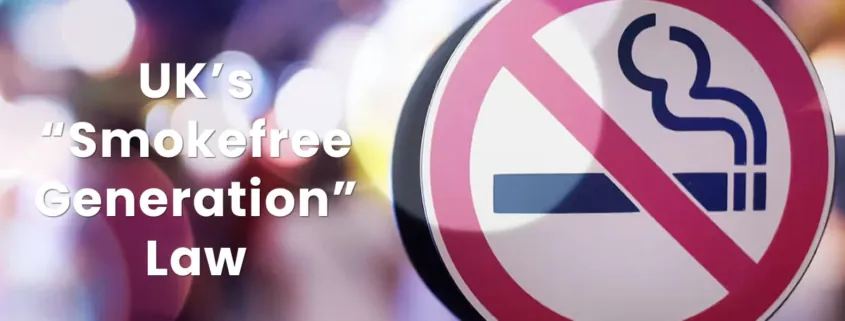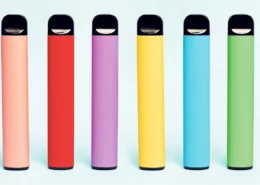How Could the UK’s “Smokefree Generation” Law Impact Vaping?
The UK government recently proposed ambitious legislation to create a “smokefree generation” by phasing out tobacco sales over time. However, the plan also threatens major vaping restrictions that could undermine smoking cessation goals.
This in-depth article examines how the proposed law aims to end tobacco use, and why accompanying vaping bans could inadvertently protect cigarettes and hurt public health.
Understanding the Smokefree Generation Law
In October 2022, UK Prime Minister Rishi Sunak announced plans to introduce a “smokefree generation” law in England. Here’s an overview of how it would work:
- The law would ban the sale of tobacco products to anyone born after a set cutoff year.
- The cutoff birthdate would move up one year, every year. For example, those born after 2008 couldn’t buy tobacco at first, then after 2009, and so on.
- This effectively phases out legal tobacco sales over time as generations age. The goal is preventing future generations from ever buying cigarettes.
- The consultation proposes starting with a 2009 cutoff, since anyone born after then is currently under age 18. This group would never reach the legal tobacco age.
- The law would only affect England initially. But the government intends to expand it UK-wide in the future.
On the surface, phasing out tobacco sales appears an effective strategy to achieve the UK’s smokefree goals. But the devil is in the details, specifically the accompanying vaping restrictions also proposed.
Concerns Over Proposed Vaping Regulations
While the smokefree generation law focuses on ending tobacco sales, UK officials also plan to introduce significant new vaping product regulations.
These could include bans or limits on:
- Vape flavors – only allowing tobacco flavors
- Nicotine levels – capping strengths to make vapes less satisfying
- Online sales – prohibiting online vape purchases
- Disposable vapes – banning popular convenient formats
The government cites reducing youth vaping as the aim of such restrictions. However, experts warn that limiting vaping options could have disastrous unintended consequences for adult smokers using e-cigarettes to quit.
How Banning Vape Flavors and Options Would Backfire
Public health bodies like Public Health England agree vaping poses only a small fraction of the risks compared to smoking. E-cigarettes offer smokers a less harmful way to get nicotine.
Vaping has helped millions of UK smokers quit or switch from cigarettes. But proposed bans threaten to undermine these public health gains.
Studies show flavors improve vaping’s effectiveness for quitting smoking. Former smokers often find tobacco flavors unappealing. Banning alternatives like fruit and dessert flavors removes a key incentive to switch.
Likewise, capping nicotine could make vaping less satisfying for hardened smokers and ex-smokers. This too discourages switching, and could lead vapers to relapse to cigarettes.
These examples illustrate how overzealous vaping regulations may protect cigarette sales rather than combat them. Limiting safer alternatives only helps the most lethal nicotine product – traditional cigarettes – retain users.
A Tobacco-Only Approach is More Effective And Avoids Unintended Harms
Rather than risk unintended consequences from vaping bans, the UK government should focus the smokefree generation law solely on phasing out tobacco sales.
Gradually ending legal access to cigarettes encourages more smokers to switch to vaping. But retaining access to reduced harm vaping products prevents pushing users back to cigarettes.
Cigarettes cause nearly all smoking-related disease and death. Discouraging their use is the most direct path to achieving smokefree goals and saving lives.
A tobacco phaseout avoids cannibalizing safer alternatives, while imposing the ultimate restriction on the deadliest nicotine product.
What Vapers Can Do To Oppose Overreaching Regulations
For vapers concerned about losing flavored e-cigs or facing more restrictive policies, there are ways to take action:
- Contact your MP – Write to your Member of Parliament explaining how switching to vaping has improved your health compared to smoking. Share concerns over bans.
- Respond to the consultation – When the government launches its public consultation, emphasize how flavored vapes aided your smoking cessation. Advocate for proportionate regulations.
- Support advocacy groups – Join CASAA, UKVIA and other organizations fighting flavor bans and excessive restrictions. Add your voice to their advocacy efforts.
- Educate smokers – Counter misinformation by explaining to smoking friends and family how vaping offers reduced health risks compared to cigarettes.
The voices and stories of vapers themselves are critical in advocating for fair regulations that don’t deprive smokers of better alternatives. Get involved to protect vaping as an option for yourself and others looking to quit cigarettes.
Balancing Smokefree Goals With Vaping Harm Reduction
When crafted appropriately, the smokefree generation law represents an innovative approach to phasing out cigarette use over time. But inappropriate vaping regulations threaten to turn groundbreaking legislation into a failure that protects smoking.
The UK can achieve a smokefree future through sensible tobacco control focused on the most lethal nicotine product – cigarettes. But it requires nuance to avoid trapping ex-smokers between banned vapes and legal cigarettes.
There is a balanced regulatory path that preserves vaping options while preventing youth uptake and steering smokers towards reduced harm alternatives. But finding it takes engaging with consumers and an emphasis on evidence, not fearmongering.
With care taken to avoid overreach, the UK can deploy its smokefree generation law to make a real public health difference without depriving adult vapers of access to products dramatically safer than cigarettes. But it will require advocacy and thoughtful policy design – not simplistic prohibition.
- Kazakhstan Seizes 150k Illegal Vapes in Almaty Raid - July 30, 2025
- Brazil Police Crack Down on E-Cigarette Smuggling - July 30, 2025
- Experts Urge South Africa to Adopt Science-Based Vape Policies - July 30, 2025








